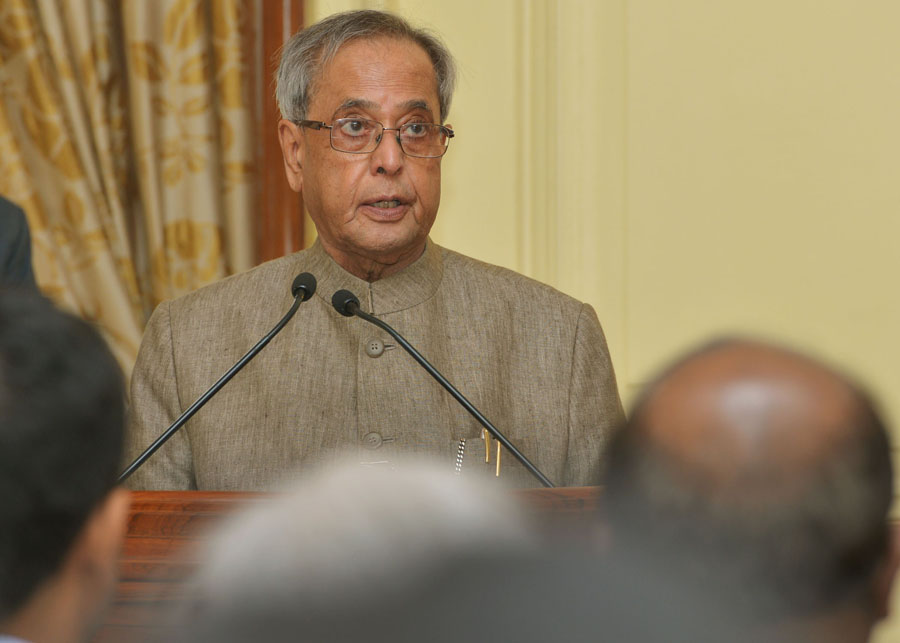Speech by the President of India, Shri Pranab Mukherjee at the Release of a Set of Eight Commemorative Postage Stamp of Indian Musicians
Rashtrapati Bhavan,Delhi : 03-09-2014
Download : Speeches ![]() (363.79 KB)
(363.79 KB)

It gives me great pleasure to release this set of commemorative postage stamps today.
As we pay tribute to eight of the greatest music maestros of contemporary India, we celebrate their life and work and their matchless legacy. These eight maestros are, without a doubt, among the tallest luminaries in the history of world music. They have not only achieved personal perfection but have made extraordinary contributions, in their respective fields, to the development and evolution of the schools of music in which their talents were nurtured and honed. Their contribution and its enrichment of our cultural heritage cannot be quantified or estimated. It is infinite in its resonance and their names will be mentioned withgreat reverence. Their music will be cherished by the young and old, for many decades to come.
I congratulate the Department of Posts for their initiative in bringing out these stamps. As these travel, pasted on letters and parcels and as they are added to the collections of stamp collectors and music connoisseurs and as they are used by people across the continents, these stamps will inform and remind all who see them of a golden era in musical achievements, a high point in the history ofshastriya sangeet in India.
At this juncture, when we Indians, as a people, we are deeply involved with so many things, political processes and economic growth and development, while also facing the challenges of a globalized world, it is comforting and invigorating to pause and reflect on our unique cultural heritage. Music, in its pure form, is spiritual nourishment for our souls. It is at the core of our cultural and secular heritage. Our classical music, which has its origin in the Vedas, is said to be a gift of God himself; it isNadabrahma, the sound of God, the music that pervades the universe.
Although one cannot sum up the achievements of these gifted souls in just a few words, I would like to pay homage by recalling a few aspects of their outstanding contribution to Indian music.
Ustad Ali Akbar Khan made his debut at the age of 13 at a music conference in Allahabad in 1936. His mastery of the sarod and his brilliant compositions gave him the title of a ‘national treasure’. As a performer and as a teacher, he popularized Indian classical music - not only in India but also in Europe and in the USA.
Pundit Bhimsen Joshi had developed the khayal form of singing. He was best known for his popular renditions of devotional music. He was a classicist by training and temperament but evolved an approach that sought to achieve a balance between "traditional values and mass-culture tastes".
Smt. D. K. Pattammal, who started her training at the age of only four years, went on to become a legend in Carnatic Music. She achieved the highest levels in her field of music . Along with Smt.M S Subbalakshmi and Smt. M L Vasanthakumari, she was considered one of the "Female Trinity of Carnatic Music”. Her perfect rendering ofRagam Tanam-Pallavi , a composition that had all along been a domain of male artists, earned her the title of"Pallavi Pattammal”.
Smt. Gangubai Hangal, another child-prodigy, made her debut in the 1924 session of the Indian National Congress in the august presence of Mahatma Gandhi, Jawaharlal Nehru, Sarojini Naidu and Maulana Abul Kalam Azad. She fought prejudice and opposition to make music her career and remained committed to classical music for 75 years - until her last concert in 2006 .
Pundit Kumar Gandharva is remembered for his creation of new ragas and for bringing the spotlight to the music of Madhya Pradesh. His legacy includes his amazing experimentation withNirguni bhajansand folksongs.
Pt. Mallikarjun Mansurof the Jaipur-Atrauli Gharana had set new standards through his mercurial improvisations in both melody and metre - without ever losing the emotional content of the songs that he rendered.
Pundit Ravi Shankar, will forever be remembered for the heights that he conquered as a legendary sitar player and composer of Hindustani classical music. He popularized the sitar in all parts of the world with his brilliant performances and creative compositions. His use of unconventional rhythmic cycles and unique compositions remain unrivaled to this day.
Ustad Vilayat Ali Khan,who introduced Indian music to the world along with Ravi Shankar and Ali Akbar Khan was another of the greatest pioneers of Indian classical music. He is undoubtedly one of the most influential musicians of the 20th century.
Ladies and Gentlemen, ours is a generation that had the privilege of knowing and witnessing the awe-inspiring performances of these eight brilliant artistes. Future generations will marvel at their genius. Many among us have been blessed with the opportunity to have personally known and experienced their uncommon prowess.
I, personally, do fervently believe that the music of India in all its diversity is one of the greatest gifts to human civilization.
I congratulate Department of Posts for bringing out these Commemorative Postage Stamps: by honouring these great legendary figures the country is honouring itself.
These stamps will be placed in the newly opened Museum of the Rashtrapati Bhavan where visitors from the different parts of India and abroad will be able to see them from this weekend onwards .
I wish you success in this and your future initiatives.
Jai Hind.
